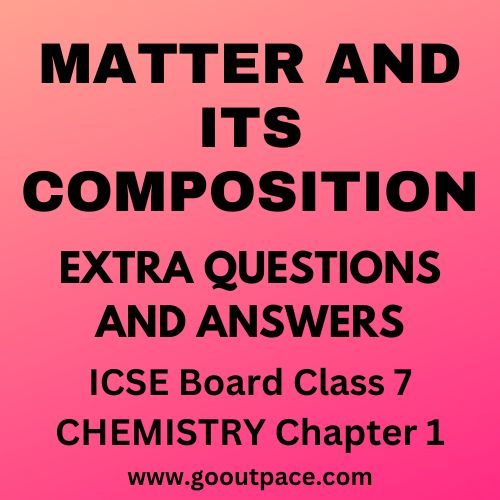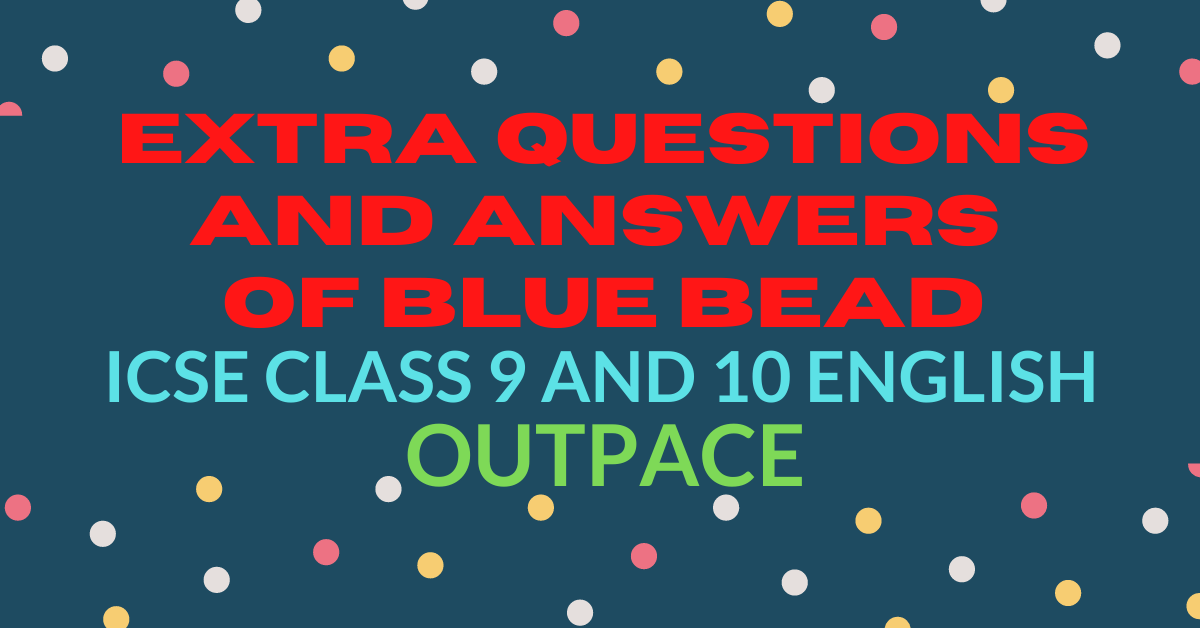You are going to go through MATTER AND ITS COMPOSITION EXTRA QUESTIONS OF CHAPTER 1 CHEMISTRY CLASS 7 ICSE. Understanding a text meticulously in its entirety is very important for a learner for scoring better in the exam. Experts made ample to ensure a thorough critical and line-by-line analysis. Let us find MATTER AND ITS COMPOSITION EXTRA QUESTIONS OF CHAPTER 1 CHEMISTRY CLASS 7 ICSE.

1. What is matter?
Matter is any substance that has mass and takes up space. It can be found in various states, such as solid, liquid, and gas, and is made up of atoms and molecules.
2. What are the characteristics of matter?
The characteristics of matter are:
Mass: the amount of matter in an object
Volume: the amount of space an object takes up
Density: mass per unit of volume
State: the physical form of matter (solid, liquid, gas)
Chemical Composition: the chemical properties of a substance
Melting point and boiling point: the temperatures at which a substance changes state.
3. What is volume?
Volume is the measure of how much space an object or substance takes up. It is typically measured in units such as liters or cubic meters.
4. Who gave atomic theory?
The atomic theory, which states that matter is composed of atoms, was first proposed by John Dalton in 1803. He formulated the atomic theory based on the idea that elements are made up of tiny, indestructible particles called atoms, and that the atoms of different elements have different properties.
5. What are atoms?
Atoms are the basic building blocks of matter. They are the smallest unit of an element that retains the chemical properties of that element. They are made up of three types of subatomic particles: protons, neutrons, and electrons.
MATTER AND ITS COMPOSITION EXTRA QUESTIONS OF CHAPTER 1 CHEMISTRY CLASS 7 ICSE
6. What are molecules?
An atom usually does not a have an independent existence. Generally, atoms combine to form molecules. It is the smallest [article of a matter which can exist independently and can retain all the physical and chemical properties of the matter.
7. Differences between an atom and a molecule.
| Atom | Molecule |
| An atom is the smallest unit of an element that retains its chemical properties Atoms are smaller in size than molecules | A molecule is a group of atoms chemically bonded together to form a compound Molecules are larger in size than atoms. |
8. What are molecules of an element?
Molecules of an element are made up of two or more atoms of the same element that are chemically bonded together. For example, a molecule of oxygen (O2) is made up of two oxygen atoms bonded together
9. What are molecules of a compound?
A molecule of a compound is a group of atoms from two or more different elements that are chemically bonded together to form a new substance. The atoms in a molecule of a compound are bonded in a specific ratio.
10. State the characteristics of Solids?
- Solids have a definite shape and volume, they retain their shape regardless of the container they are in.
- Solids have a fixed density, meaning the mass per unit volume is constant.
- Solids have low compressibility and high rigidity, they are difficult to compress and maintain their shape under stress.
- Solids have low ability to flow, they do not easily change shape or flow like liquids or gases.
11. State the characteristics of Liquids?
- Liquids have a definite volume but no definite shape, they take the shape of the container they are in.
- Liquids have a fixed density, meaning the mass per unit volume is constant.
- Liquids have moderate compressibility and low rigidity.
- Liquids have a high ability to flow, they can easily change shape or flow.
12. State the characteristics of Gases?
- Gases do not have a definite shape or volume and will fill any container they are in.
- Gases have a low density compared to solids and liquids.
- Gases have high compressibility and low rigidity.
- Gases have a very high ability to flow and can quickly move and fill any space.
13. Differences between solids, liquids and gases.
| Property | Solids | Liquids | Gases |
| Shape | Definite | No definite shape | No definite shape |
| Volume | Definite | Definite | No definite volume |
| Density | Fixed | Fixed | Low |
| Compressibility | Low | Moderate | High |
| Rigidity | High | Low | Low |
| Ability to flow | Low | High | High |
Please note that this is a general comparison and there are also many exceptions and variations of each state of matter depending on the conditions and substances involved.


